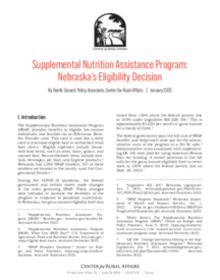The Supplemental Nutrition Assistance Program (SNAP) provides benefits to eligible low-income individuals and families via an Electronic Benefits Transfer card. This card is used like a debit card to purchase eligible food in authorized retail food stores. Eligible expenses include household food items, such as meat, dairy, grains, and canned food. Non-authorized items include alcoholic beverages, pet food, and hygiene products. Nebraska has 1,290 SNAP retailers; 527 of these retailers are located in the mostly rural 3rd Congressional District.
During the COVID-19 pandemic, the federal government and certain states made changes to the rules governing SNAP. These changes were intended to increase the flexibility of the program in response to pandemic uncertainty. In Nebraska, the gross income eligibility level was raised from 130% above the federal poverty line to 165% under Legislative Bill (LB) 108. This is approximately $3,020 per month in gross income for a family of three.
The federal government pays the full cost of SNAP benefits and helps each state pay for the administrative costs of the program in a 50/50 split. Administrative costs associated with implementing LB 108 were paid for using American Rescue Plan Act funding. A sunset provision in the bill calls for the gross income eligibility limit to revert back to 130% above the federal poverty line on Sept. 30, 2023.


